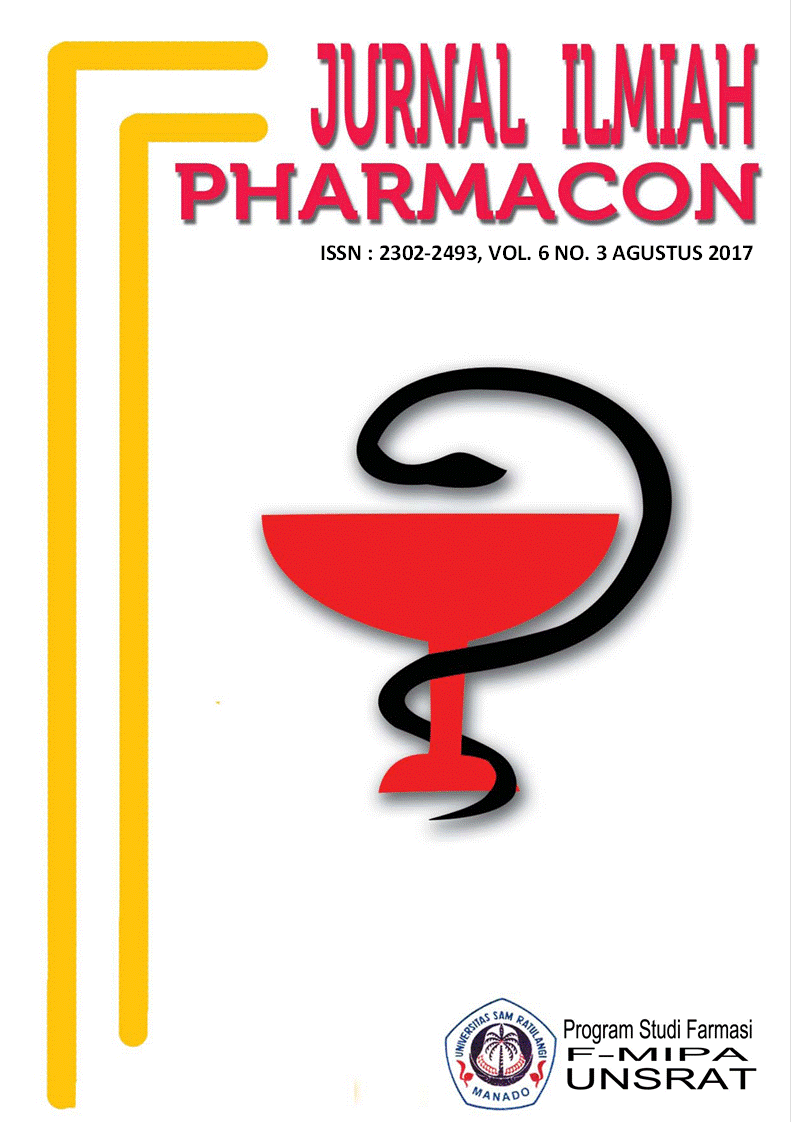PENGARUH PEMBERIAN EKSTRAK DAUN LOLA KAHORI (Erythrina variegata L.) TERHADAP SPERMATOGENESIS TIKUS PUTIH JANTAN GALUR WISTAR (Rattus norvegicus L.)
DOI:
https://doi.org/10.35799/pha.6.2017.16801Abstract
PENGARUH PEMBERIAN EKSTRAK DAUN LOLA KAHORI (Erythrina variegata L.) TERHADAP SPERMATOGENESIS TIKUS PUTIH JANTAN GALUR WISTAR (Rattus norvegicus L.)
Â
Sri Dewi Kusumawati1), Edwin De Queljoe1), Fatimawali1)
1)Program Studi Farmasi FMIPA UNSRAT Manado, 95115
Â
ABSTRACT
Family Planning Program (KB) is a program organized by the government with the aim to control the rate of the growthof the population. However, as this far male participation in family planning programs are still relatively low when compared with women’s participation due to the lack of alternative treatment, one of them is Lola Kahori (Eryhtrina variegata L.), which is as medical plant that has been used empirically as antifertility. This study aims to determine the effect of ethanol extract of Lola Kahori leaves on the spermatogenesis of male while rat. Extraction was used with 96% of ethanol solvent. The observation of spermatogenesis was using the Jhonson score on testicular test of male white rat testis, which had been treated with Lola Kahori leaf ethanol etract with concentration of 200mg, 400mg, 800mg, respectively. The statistic result test showed there is no effect of Lola Kahori leaf ethanol extract against spermatogenesis of male white rat, but as observation and graphically showed a decrease in spermatogenesis of male white rats (Rattus norvegicus L.) which had been treated.
Keywords : Lola Kahori (Erythrina variegata L.), Family Planning (KB), Spermatogenesis, Male White Rat ( Rattus norvegicus L.)
Â
ABSTRAK
Program keluarga berencana (KB) merupakan program yang diselenggarakan oleh pemerintah dengan tujuan untuk mengendalikan laju pertumbuhan penduduk. Namun, selama ini partisipasi laki-laki dalam program keluarga berencana masih relatif rendah bila dibandingkan dengan keikutsertaan perempuan karena kurangnya pilihan alternatif. Saat ini banyak masyarakat yang beralih memanfaatkan tumbuhan sebagai salah satu alternatif pengobatan, salah satunya adalah tumbuhan Lola Kahori (Erythrina variegata L.) yang merupakan tumbuhan berkhasiat obat yang telah digunakan secara empiris sebagai antifertilitas. Penelitian ini bertujuan untuk mengetahui pengaruh pemberian ekstrak etanol daun Lola Kahori terhadap proses spermatogenesis tikus putih jantan. Ekstraksi digunakan dengan menggunakan pelarut etanol 96%. Pengamatan spermatogenesis dilakukan dengan menggunakan penilaian skor Johnson terhadap preparat sayatan testis tikus putih jantan yang sebelumnya telah diberi perlakuan dengan ekstrak etanol daun Lola Kahori dengan konsentrasi 200mg, 400mg dan 800mg. Hasil uji statistik menunjukkan tidak ada pengaruh pemberian ekstrak etanol daun Lola Kahori terhadap proses spermatogenesis tikus putih jantan, namun secara pengamatan dan grafik terlihat adanya penurunan pada proses spermatogenesis tikus putih jantan galur wistar (Rattus norvegicus) yang telah mendapatkan perlakuan.
Kata kunci : Lola Kahori (Erythrina variegata L.), Keluarga Berencana (KB), Spermatogenesis, Tikus Putih Jantan
Â
Â
Downloads
Published
How to Cite
Issue
Section
License
Authors who publish with this journal agree to the following terms:
- Authors retain copyright and grant the journal right of first publication with the work simultaneously licensed under a Creative Commons Attribution-NonCommercial 4.0 International License that allows others to share the work with an acknowledgement of the work's authorship and initial publication in this journal.
- Authors are permitted and encouraged to post their work online (e.g., in institutional repositories or on their website) prior to and during the submission process, as it can lead to productive exchanges, as well as earlier and greater citation of published work (See The Effect of Open Access)










